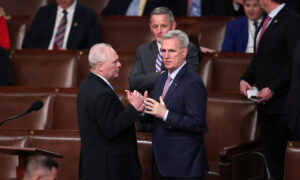House Republicans Tout Record During First 100 Days
House Republican leaders showcased their message discipline on April 17, and made their decision to reopen the U.S. Capitol a touchstone of their record during the first 100 days of the 118th Congress. “In our first 100 days, House Republicans not only reopened the House, as our speaker talked about—the People’s House, by the way, not Pelosi’s House—we passed a rules package to create a more transparent, member-driven legislative process,” said House Majority Whip Tom Emmer (R-Minn.) in a press conference with many GOP colleagues. Emmer was referencing a package championed by 20 House Republican dissidents, who initially resisted electing Rep. Kevin McCarthy (R-Calif.) Speaker of the House. “For the first time in seven years, we had a complete open rule,” McCarthy noted in his remarks at the press conference. “More bills have been signed into law in this Congress than the last, even though we have divided government,” he told reporters. McCarthy also described the Senate under the leadership of Chuck Schumer (D-N.Y.) as “unproductive” compared with the chamber he leads. House Majority Leader Steve Scalise (R-La.) reminded Americans that President Joe Biden ultimately signed a resolution to overturn a controversial crime bill from Washington, D.C.’s city council. That marked a reversal from his earlier stance against the GOP-led effort. “If he [Biden] comes out against a bill, [that] means there’s a pretty good chance he actually might end up signing it into law,” Scalise said. Members also stressed their ability to work across the aisle in the current House—not the story told in most reporting about D.C. lawmakers in 2023. “House Republicans are accomplishing a lot in a productive, bipartisan fashion,” said McCarthy, who noted that more than 80 percent of the bills passed so far have been bipartisan. “Every member of this conference is laser-focused on listening to the American people, keeping our promises, and delivering those results,” said Rep. Elise Stefanik (R-N.Y.), who chairs the House Republican Conference. In addition to spotlighting the reopening of the Capitol, a critical and symbolic move roughly two years after the events of Jan. 6, 2021, the Republicans who spoke on April 17 frequently alluded to McCarthy’s “Commitment to America.” China, Energy, COVID, Parental Rights Emmer highlighted the creation of a select committee on the Chinese Communist Party (CCP) in the current Congress, as well as the passage of a bill to prevent the sale of oil from the Strategic Petroleum Reserve to China, benefitting the CCP. The House’s freshman class president, Rep. Russel Fry (R-S.C.), took issue with Biden’s “non-existent approach to a hostile China,” saying that the House was investigating financial links between the Biden family and CCP-linked individuals. Scalise challenged Schumer to take up the House Republicans’ signature energy bill, H.R. 1. Rep. Wesley Hunt (R-Texas), another freshman in the House, said that the United States’ reliance on foreign adversaries for energy under the Biden’s policies is “a clear issue of national security.” House Republicans also touted their policy leadership in ending the COVID-19 national emergency and passing the Parents Bill of Rights Act, among other moves. “Democrats want bureaucrats to be in charge. Republicans stand with parents,” said another Congressional newcomer Rep. Erin Houchins (R-Ind.).

House Republican leaders showcased their message discipline on April 17, and made their decision to reopen the U.S. Capitol a touchstone of their record during the first 100 days of the 118th Congress.
“In our first 100 days, House Republicans not only reopened the House, as our speaker talked about—the People’s House, by the way, not Pelosi’s House—we passed a rules package to create a more transparent, member-driven legislative process,” said House Majority Whip Tom Emmer (R-Minn.) in a press conference with many GOP colleagues.
Emmer was referencing a package championed by 20 House Republican dissidents, who initially resisted electing Rep. Kevin McCarthy (R-Calif.) Speaker of the House.
“For the first time in seven years, we had a complete open rule,” McCarthy noted in his remarks at the press conference.
“More bills have been signed into law in this Congress than the last, even though we have divided government,” he told reporters.
McCarthy also described the Senate under the leadership of Chuck Schumer (D-N.Y.) as “unproductive” compared with the chamber he leads.
House Majority Leader Steve Scalise (R-La.) reminded Americans that President Joe Biden ultimately signed a resolution to overturn a controversial crime bill from Washington, D.C.’s city council. That marked a reversal from his earlier stance against the GOP-led effort.
“If he [Biden] comes out against a bill, [that] means there’s a pretty good chance he actually might end up signing it into law,” Scalise said.
Members also stressed their ability to work across the aisle in the current House—not the story told in most reporting about D.C. lawmakers in 2023.
“House Republicans are accomplishing a lot in a productive, bipartisan fashion,” said McCarthy, who noted that more than 80 percent of the bills passed so far have been bipartisan.
“Every member of this conference is laser-focused on listening to the American people, keeping our promises, and delivering those results,” said Rep. Elise Stefanik (R-N.Y.), who chairs the House Republican Conference.
In addition to spotlighting the reopening of the Capitol, a critical and symbolic move roughly two years after the events of Jan. 6, 2021, the Republicans who spoke on April 17 frequently alluded to McCarthy’s “Commitment to America.”
China, Energy, COVID, Parental Rights
Emmer highlighted the creation of a select committee on the Chinese Communist Party (CCP) in the current Congress, as well as the passage of a bill to prevent the sale of oil from the Strategic Petroleum Reserve to China, benefitting the CCP.
The House’s freshman class president, Rep. Russel Fry (R-S.C.), took issue with Biden’s “non-existent approach to a hostile China,” saying that the House was investigating financial links between the Biden family and CCP-linked individuals.
Scalise challenged Schumer to take up the House Republicans’ signature energy bill, H.R. 1.
Rep. Wesley Hunt (R-Texas), another freshman in the House, said that the United States’ reliance on foreign adversaries for energy under the Biden’s policies is “a clear issue of national security.”
House Republicans also touted their policy leadership in ending the COVID-19 national emergency and passing the Parents Bill of Rights Act, among other moves.
“Democrats want bureaucrats to be in charge. Republicans stand with parents,” said another Congressional newcomer Rep. Erin Houchins (R-Ind.).












